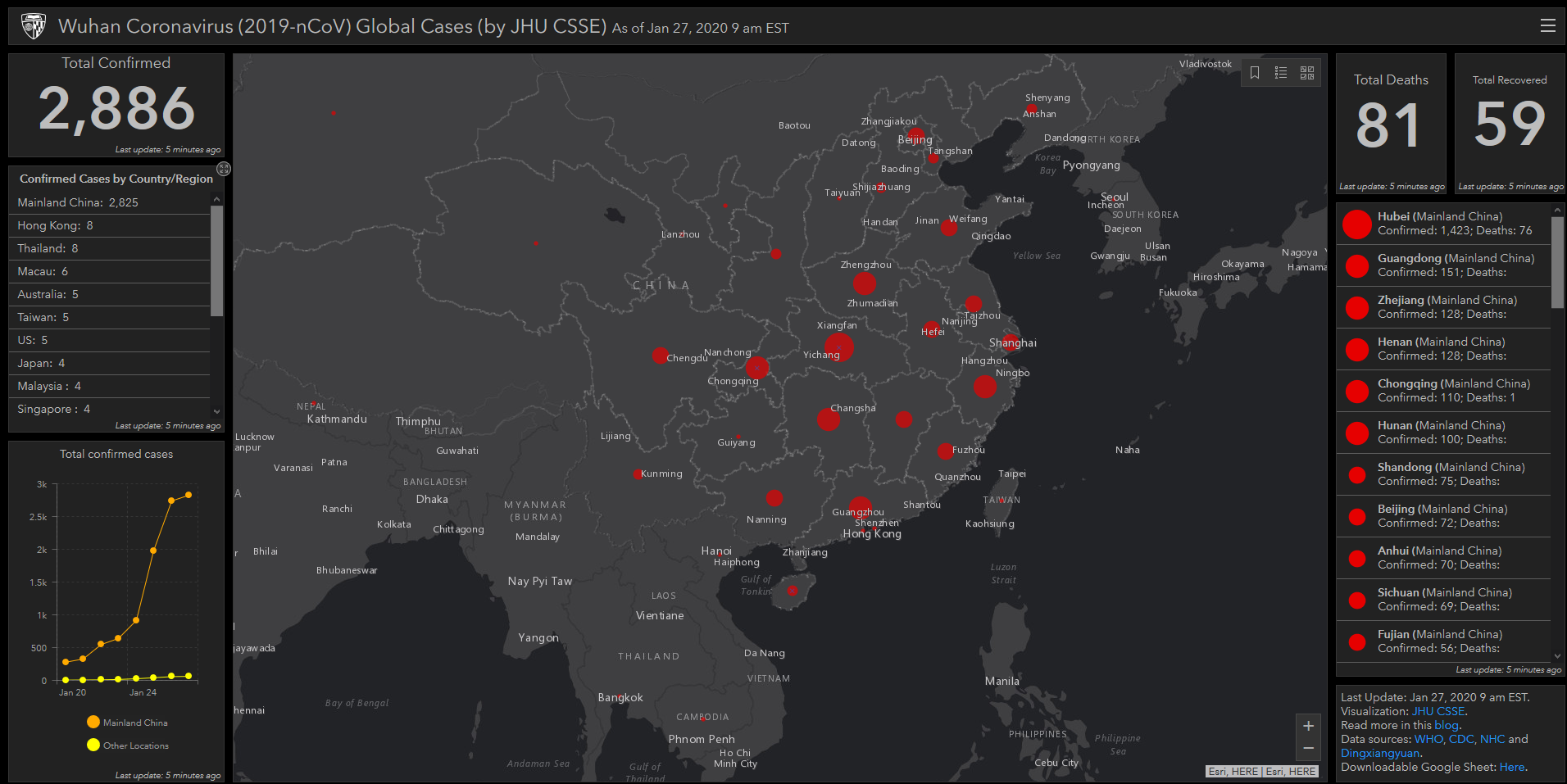An online map has gone up to track in near real time the spread of novel coronavirus which emerged in China’s Wuhan city across the world.
More than 2,889 people have already been confirmed infected with the novel coronavirus—and over 80 killed, according to the dashboard maintained by the Johns Hopkins Center for Systems Science and Engineering.
Some 2,825 of the confirmed cases are in Mainland China alone.
The map also shows 59 people have recovered upon treatment.
Civil engineering professor, Lauren Gardner, and CSSE’s co-director lead effort to launch the mapping website.
In addition to displaying numbers of confirmed cases, deaths and recoveries on a global map, it also allows visitors to download the data for free.
“We built this dashboard because we think it is important for the public to have an understanding of the outbreak situation as it unfolds with transparent data sources,” Gardner said.
“For the research community, this data will become more valuable as we continue to collect it over time.”
Panic
Despite the buzz about the novel coronavirus, the Nigeria Centre for Disease Control has called for caution.
It is worried the media may be escalating anxiety with headlines talking of a “killer virus” and “growing fears” around the world.
In truth, from what we currently know, the 2019-nCoV has moderate transmissibility and relatively low pathogenicity, it stated.
It also pointed out that the case fatality ratio for novel coronavirus doesn’t come close to that for Ebola. Case fatality ratio—the proportion of people infected who die from a disease—for Ebola reached 50%: that means 20 out of 40 people infected with Ebola died.
“Infact, WHO said CFR for Ebola have varied from 25% to 90% in past outbreak, so think about this before you say DEADLY,” the centre warned.
“Actually, there is no reason to foster panic with exaggerated language. WHO has been very proactive and measured. The Nigeria Centre for Disease Control (NCDC) has repeatedly reiterated that they are working with WHO daily,” it said.
WHO assesses the risk of outbreak as high in China and moderate globally, including West Africa.
The West African Health Organisation—ECOWAS’ institution for health—has called on countries to take “precautionary measures”, noting cases may appear in any country due to international travel.
It backs WHO’s recommendations to countries regarding “active surveillance, early detection, isolation and case management, and contact tracing to prevent further spread of this outbreak,” WAHO said in an advisory
Concern arose after a passenger suspected to be ill with coronavirus arrived Abidjan airport and was immediately “detected and isolated”—and tests are being performed to confirm whether it is coronavirus or not.
WAHO has also implemented a regional laboratory network for access to rapid biological diagnostic facilities by Member States, and has a standby Regional Rapid Response Team to support countries if required.
Reducing risk
The WHO’s advisory lists six ways to reduce risk of contracting the novel coronavirus:
- Frequently clean hands by using alcohol-based hand rub or soap and water;
- When coughing and sneezing, cover mouth and nose with flexed elbow or tissue – throw tissue away immediately and wash hands;
- Avoid close contact with anyone who has fever and cough;
- If you have fever, cough and difficulty breathing, seek medical care early and share previous travel history with your health care provider;
- When visiting live markets in areas currently experiencing cases of novel coronavirus, avoid direct unprotected contact with live animals and surfaces in contact with animals;
- The consumption of raw or undercooked animal products should be avoided. Raw meat, milk or animal organs should be handled with care, to avoid cross-contamination with uncooked foods, as per good food safety practices.

 Join Daily Trust WhatsApp Community For Quick Access To News and Happenings Around You.
Join Daily Trust WhatsApp Community For Quick Access To News and Happenings Around You.

